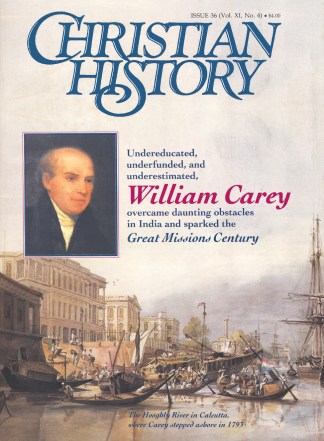Ten years ago, Dr. Ken Curtis had a crazy idea: Launch a church-history magazine.
“Nobody wants to read a magazine about church history,” the experts told him. “Who would subscribe? Who would advertise? A nice idea, but it will never fly.”
But here we are, ten years later. It hasn’t always been easy (see interview in this issue), but we have now published 36 issues on the people, events, and movements that have shaped our Christian faith. Thanks to you, Christian History has not only survived but is thriving.
Our family of subscribers continues to grow—we’re nearing 50,000 now. The vast majority of you renew your subscriptions. You introduce the magazine to others. And 93 percent of you save every issue. You have proven the experts wrong and shown that people do want to learn more about their Christian heritage. We feel deeply grateful for your support.
And the word continues to spread. Not long ago, Dwight Gibson of the Slavic Gospel Association stopped by our offices. “Christian History is a great magazine,” he began, “but I had to go to Central Europe to find out about it. In Czechoslovakia, the believers showed me a copy. They were translating the issue [No. 13] on Jan Comenius. Although he’s a famous Czech leader who’s pictured on the 20-Kronur note of the country, people there had never known about his deep Christian faith. They’d never been told.”
William Carey was perhaps the least likely candidate imaginable for the title many now bestow on him: Father of Modern Missions. He was an undereducated and poor shoemaker, sometime schoolteacher, and preacher who struggled to be ordained.
Further, Carey was born in an age when many people were utterly indifferent, even hostile, to the notion of missions. But Carey couldn’t get around the Great Commission’s “obligations” (as he put it) for Christians in his day. (Interestingly, Carey was profoundly influenced by the Moravians, who were featured in Christian History’s premiere issue.) Through his famous Enquiry and his 40 years of dogged service in India, Carey motivated the English-speaking world to do something.
As thousands imitated Carey, the 1800s became a Great Missions Century that reshaped modern Christianity. It may be, as historian Bruce Shelley ponders, that “missionaries from the neo-pagan nations of Europe and North America succeeded in giving Christianity a stake in the future by carrying the gospel to Africa and Latin America.”
In one sense, the Christian church is God-established and eternal. In another sense, Christianity is always one generation from extinction. The faith has survived for 2,000 years because one person has gone to tell another. And for Christianity to continue even fifty more years, we will need to be like William Carey, forget how undereducated and underfunded we are, face our daunting obstacles, and go.
Copyright © 1992 by the author or Christianity Today/Christian History magazine. Click here for reprint information on Christian History.










